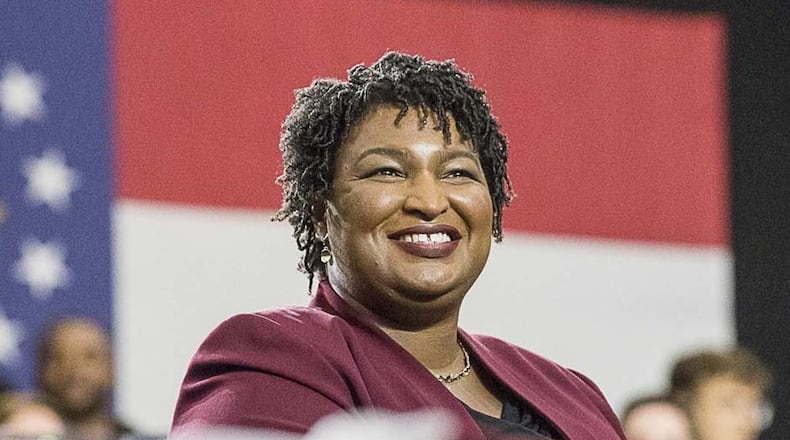The state ethics commission’s director told the panel Wednesday that a voting advocacy nonprofit connected to Stacey Abrams acted as a political committee during the 2018 elections and should have both registered with the state and reported how much it raised and spent.
David Emadi, the executive director of the commission, also raised questions about whether the New Georgia Project Action Fund — which is affiliated with another nonprofit Abrams founded but no longer leads, the New Georgia Project — illegally coordinated with her campaign.
Emadi said the investigation of Abrams’ campaign and groups that backed her unsuccessful bid for governor in 2018 is ongoing and that he had not yet determined whether coordination between the organizations occurred. Under state law, so-called “independent” committees can work to help get people elected but are not allowed to coordinate their activities with a candidate.
Abrams, a Democrat, narrowly lost the 2018 general election to Republican Brian Kemp in the most expensive gubernatorial contest in Georgia history.
The new details about Emadi’s investigation became public during a commission meeting in which lawyers for the New Georgia Project and the New Georgia Project Action Fund asked the panel to quash subpoenas for records including insurance policies, bank statements and campaign materials.
“This appears to be a fishing expedition,” said Aria Branch, a lawyer representing the two nonprofits. “That is not allowed under the commission’s rules.”
The commissioners rejected the request, and the commission’s chairman, Jake Evans, said there was enough evidence to suggest the groups may have violated campaign finance laws.
The Abrams campaign last week filed motions in court to quash a demand for more records that officials say would show it exceeded legal contribution limits. Abrams' attorneys said it had already sufficiently complied with the ethics commission's request.
In the court filing, the campaign said the commission was seeking documents that are unrelated to campaign finance issues — which are within the panel’s jurisdiction. And it said that it has no documents showing illegal coordination between the campaign and third-party groups that backed her unsuccessful bid for governor.
Emadi angered Abrams' backers shortly after he took office in April by saying he would subpoena her campaign records and those of groups that supported her. The commission sought all correspondence between the campaign and a number of groups that registered and mobilized voters, many with a focus on energizing minorities.
They included the voting rights group Abrams helped launch after her defeat last year and a nonprofit co-founded by state Sen. Nikema Williams, the head of the state Democratic Party.
Emadi revealed that investigators intend to present evidence the Abrams campaign accepted donations from four groups that exceeded maximum contribution limits for a statewide campaign. Abrams’ attorney has denied the claim, and her campaign manager said the commission has failed to prove any wrongdoing.
Abrams’ supporters have pointed to Emadi’s past ties to the Republican Party to accuse him of bias. He is a former officer in the Douglas County GOP and donated $600 to Kemp’s campaign. Evans, the panel’s chairman, is head of a local Young Republicans group.
In the subpoenas involving the two related nonprofits — the New Georgia Project, a voter registration group, and the New Georgia Project Action Fund — their attorney, Branch, said the only political involvement was that the fund was hired to do canvassing by two groups supporting Abrams.
Campaign records show the fund received $700,000 from PowerPac, a group that spent millions backing Abrams and was mostly funded by liberal San Francisco-based philanthropist Susan Sandler. In campaign reports, the money is listed as going for “get out the vote canvassing,” “canvassing” and a “voter contact program.” Branch presented the commission with copies of agreements between the the New Georgia Protect Action Fund and PowerPac.
Many records in ethics investigations become public once a case is completed. Branch said release of at least some of the documents requested would violate the First Amendment rights of, for instance, donors to the nonprofits. “If they (the groups) are required to open their books to the commission …. that would chill political speech,” she said.
But Emadi said the New Georgia Project and the New Georgia Project Action Fund shared staffers and that the fund raised money and put out literature and social media posts promoting Abrams and other Democrats, essentially acting as a campaign committee. It also operated a ballot committee backing Gwinnett County’s MARTA referendum last year, he said.
Campaign committees that advocate for candidates or causes are required by law to register with the state and report what they raise and spend. Nonprofits such as the New Georgia Project and the New Georgia Project Action Fund do not face such requirements although they have to make tax filings.
Wedneday’s meeting was only one step in what will likely be a lengthy fight between the commission and the groups. Branch indicated the nonprofits will ask the courts to quash the commission’s subpoenas.
Such ethics cases can drag on for years, which means it could bump up against the 2022 campaign season, when Abrams may seek a rematch against Kemp.
About the Author





